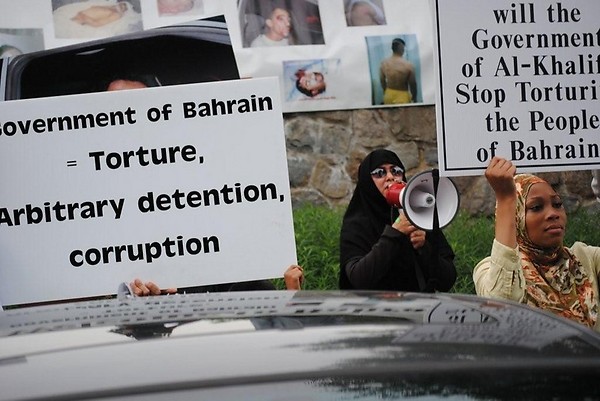
RNA - The report which was released in Beirut on Friday comes after the trials of civilians at military courts after Bahrain’s parliament in March approved the trial of civilians at military tribunals in a measure blasted by human rights campaigners as being tantamount to imposition of an undeclared martial law countrywide.
Civilians so far tried in these courts are accused of attempting to commit crimes against Bahrain Army and they include human rights activist Mohammed Al Mutghawi and Sayed Alawi Husain, who is the personal attendant of the highest Shiite religious cleric in Bahrain Shaikh Isa Qassim.
It is important to note that this is now the first military trial for civilians since the recent legal amendment to the military judiciary.
The human rights organizations participating in drafting and writing of this report are: Bahrain Center for Human Rights (BCHR), Bahrain Forum for Human Rights, Persian Gulf Institute for Democracy and Human Rights (GIDHR), SALAM for Democracy and Human Rights.
Violation of fair trial procedures
The Bahrain Center for Human Rights (BCHR) said that "the trial violates fair trial procedures and that some of the accused were subjected to torture and ill-treatment". It added: "The recent constitutional amendment to the military judiciary was used to expose them to a trial that produces harsh sentences, as well as the arbitrariness of punitive sentences against three accused persons arrested as children", explaining that "two of the accused were forcibly disappeared around the year, namely Sayed Alawi Husain and Fadhel Abbas, without being investigated for their enforced disappearance.
Military Impunity
The President of the Bahrain Forum for Human Rights, Baqer Darwish, said that the "judiciary did not investigate the defendants' allegations of torture and ill-treatment. Military courts resorted to intimidating methods to threaten some of the families of victims and lawyers by exposing them to degrading treatment if violations were revealed on the media, or by human rights organizations". He also noted "In view of this, the judiciary has used the decision to secrecy of hearings to commit abuses and to enable those involved in torturing the accused with impunity".
Military courts violate rights of civilians
Asma Darwish, the Head of International Relations in SALAM for Democracy and Human Rights, pointed out that "the right to fair trials is an inherent right of any citizen anywhere and at any time, and no one has the right to violate such rights. Incompatible with these inherent rights. Therefore, the decision to try citizens in military courts must be brought to an end because they do not conform to these inherent rights".
Yahya Al Hadid, President of the Persian Gulf Institute for Democracy and Human Rights, criticized the "role played by the National Institute for Human Rights (NIHR) by issuing a statement praising the proceedings of the case, while it did not mention in its statement on the 14th of November 2017 that the military judiciary is not the usual judge stipulated in Article 14 of the International Covenant on Civil and Political Rights."
The report recommended the repeal of the constitutional amendment and the restoration of Article 105 of the Bahraini Constitution as it was; to ensure that civilians are not tried in military courts. The report also stressed that the UN Secretary-General, the High Commissioner and the members of the Human Rights Council should urge the Government of Bahrain to adopt the basic principles on the independence and application of the judiciary.
US-backed violations
Thousands of anti-regime protesters have held demonstrations in Bahrain on an almost daily basis ever since a popular uprising began in the country in mid-February 2011.
They are demanding that the Al Khalifah dynasty relinquish power and allow a just democratic system in the country.
The US-backed regime has gone to great lengths to clamp down on any sign of dissent. On March 14, 2011, troops from Saudi Arabia and the United Arab Emirates were deployed to assist Bahrain in its crackdown.
Source: Alwaght
847/940